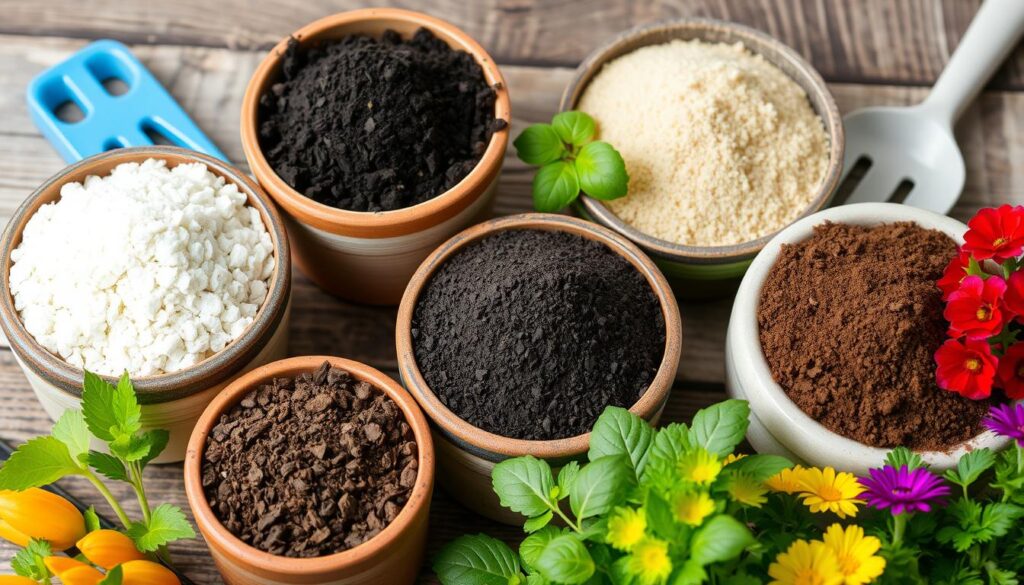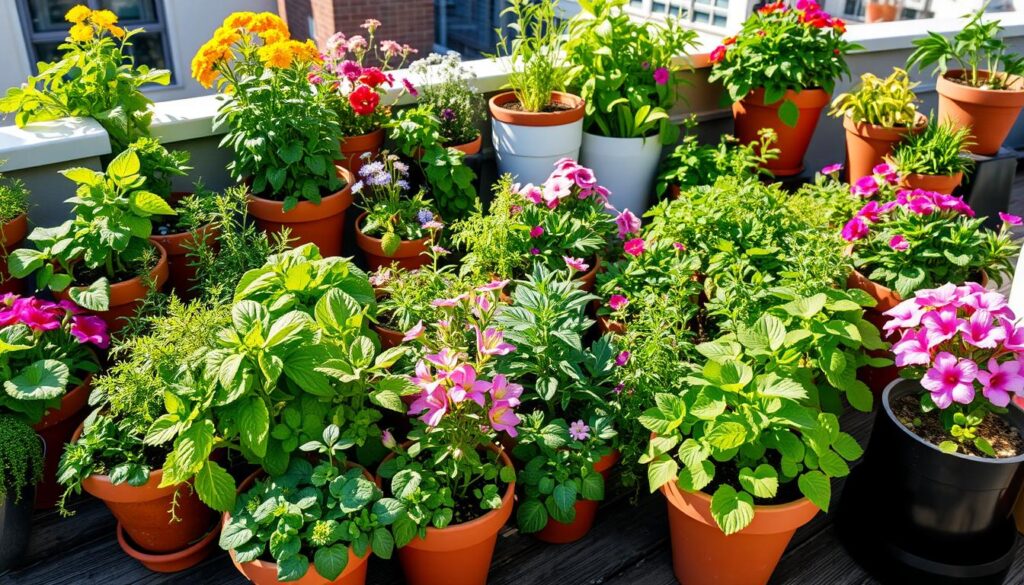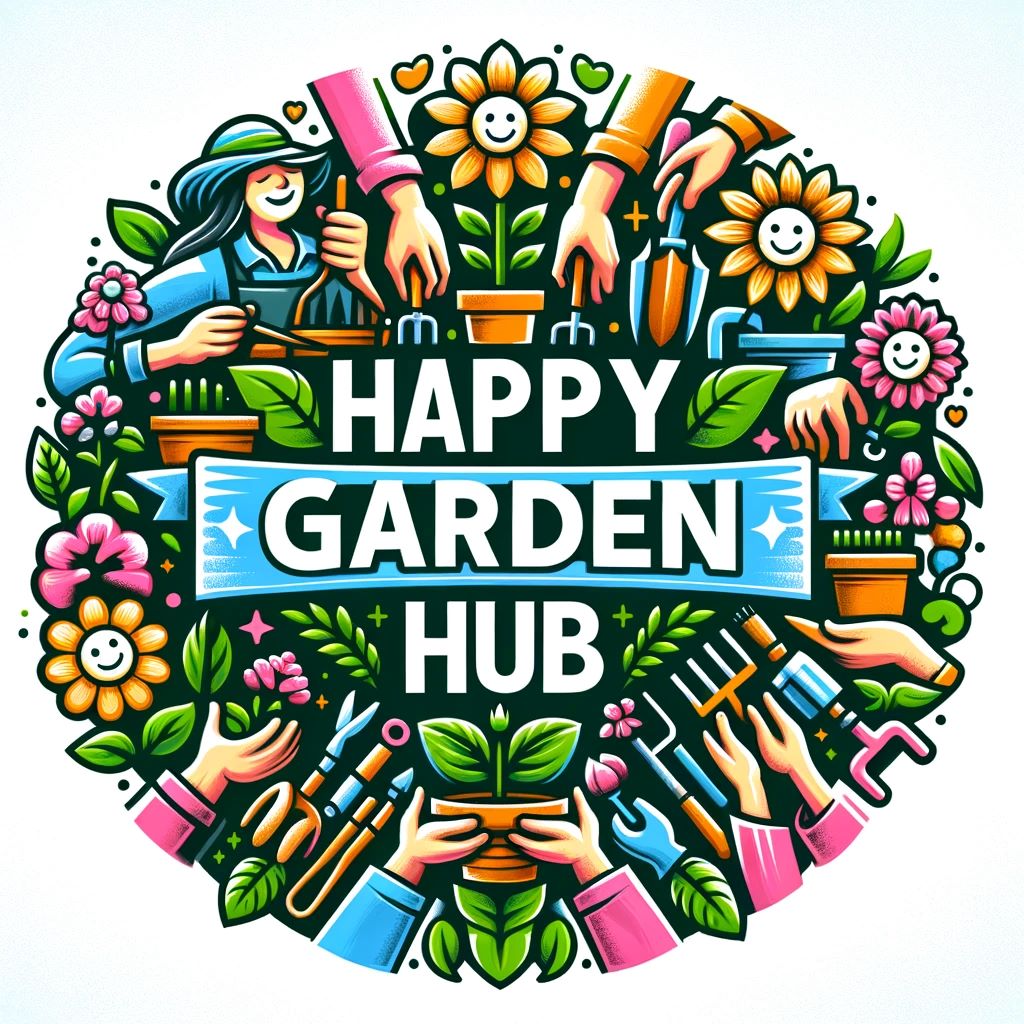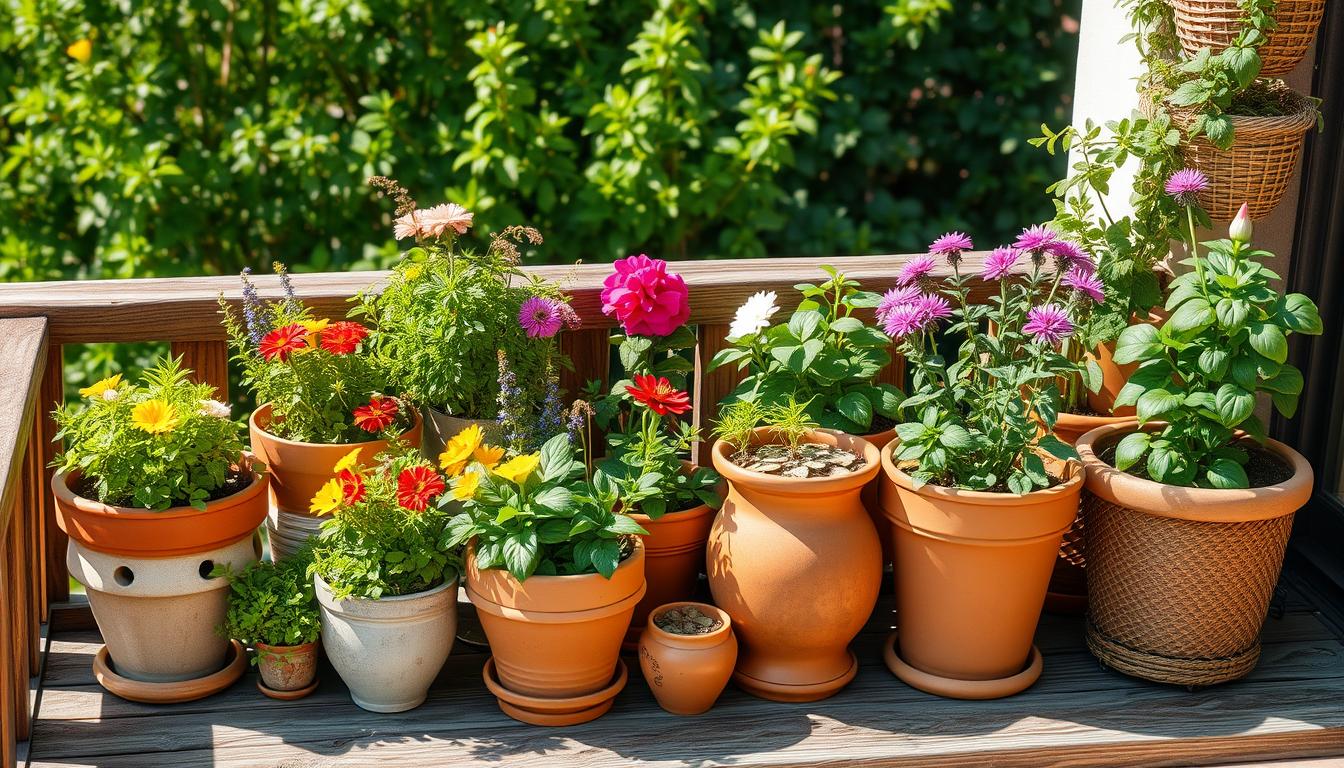This post contains affiliate links.
Imagine stepping out onto your balcony or patio and finding a lush paradise. Container gardening turns small spaces into vibrant sanctuaries. It’s a personal journey with every plant you nurture, each pot a chance to express your unique style.
Whether you’re a seasoned gardener or just starting, container gardening ideas offer creativity and flexibility. It’s a way to bring life to a corner of your world.
Urban living is on the rise, and so is the need for small space gardening. From chic balcony gardening ideas to creative container garden designs, the choices are endless. With the right containers and plants, you can create a tranquil oasis right outside your door.
This guide will show you a variety of container gardening ideas. It will inspire you to cultivate fresh air in your everyday surroundings.
Key Takeaways
- Container gardening allows for personalized plant selection and arrangements.
- It’s perfect for homeowners and renters alike, accommodating various living situations.
- Creative design can transform small spaces into functional and beautiful gardens.
- Utilizing drainage techniques is essential for plant health in containers.
- Choosing the right soil mix and watering regimen enhances gardening success.
Why Choose Container Gardening?
Container gardening is becoming more popular for good reasons. It’s perfect for those with small spaces, like city dwellers. Even balconies, patios, and windowsills can become lush gardens.
It lets you get creative with your gardening. It’s great for areas that are hard to garden in. Plus, you can move your plants around to get the best light, keeping them happy all year.
Container gardens have many perks. They often have fewer pests and diseases than plants in the ground. This means your plants can grow stronger and healthier.
Indoor container gardening also lets you grow plants year-round. You can even grow veggies and herbs indoors. It’s a fun way to enjoy gardening all the time.
It’s also good for the planet. It helps reduce the need for long-distance food transport and saves water. Gardening in containers can make you feel more connected to nature and your plants.
Container Gardening Ideas: Creating Your Own Oasis
Creating a container garden lets you design your own personal oasis. It’s perfect for both indoor and outdoor spaces. This style offers many benefits, fitting different environments and tastes.
It lets you pick the best plants and get creative with your garden. You can use it for sunny balconies or shaded patios. It’s great for small spaces.
Benefits of Container Gardening
Container gardening has many advantages for gardeners. Some key benefits include:
- Creative control: Design is easy with many plant combinations, colors, and textures.
- Mobility: Move pots to get more sunlight or protect plants from bad weather.
- Low maintenance: It’s easier to manage weeds and soil than in traditional gardens.
- Custom growing conditions: Use different pots for specific soil types and drainage, meeting plant needs.
- Extended growing season: Bring plants inside during cold months to garden all year.
Ideal for Small Spaces
This style is perfect for city dwellers and apartment renters. It brings life to small areas. For example:
- Window boxes: Add charm and extra growing space where regular gardens can’t fit.
- Tiered hanging baskets: Add depth and interest on porches, showing off beautiful blooms.
- Decorative pots on front steps: Improve curb appeal with colorful annuals.
With these ideas, small spaces become lively sanctuaries. Enjoy nature’s beauty at home. Let container gardening create an oasis that shows off your style.
Best Container Plants for Every Space
Choosing the right plants is key for a great container garden. Many plants do well in pots, adding beauty and flavor. The right plants can turn any small space into a lively green area, perfect for looks and food.
Flowering Plants
Annual flowering plants can make any container pop. Zinnias and plumbago add color and scent. Gomphrena Ping Pong Lavender and SunPatiens Compact Orchid look great together.
Verbena is a reliable choice for color. It blooms all season. Calibrachoa varieties, like Superbells Doublette Love Swept, add cascading beauty.
Herb Gardens
Herb gardens in containers are practical and flavorful. Herbs like parsley, cilantro, and basil grow well in pots. Mixing lemongrass with Supertunias adds fragrance and texture.
Lemon thyme is both pretty and useful in the kitchen. These herbs are easy to care for and perfect for small spaces.
Vegetable Container Gardening Options
Vegetable gardens in containers are great for fresh produce. Tomatoes, peppers, and greens do well in small areas. They’re perfect for growing food in tight spaces.
Choose plants that grow well in small spaces for tasty meals from your patio.
| Plant Type | Examples | Key Benefits |
|---|---|---|
| Flowering Plants | Zinnias, Plumbago | Colorful blooms, filling containers |
| Herbs | Basil, Mint, Thyme | Fragrance, culinary use |
| Vegetables | Tomatoes, Peppers | Home-grown produce, space-saving |
Essential Tips for Container Gardening Success
Container gardening success depends on several factors. These include the right soil and a good watering routine. Finding the right balance is key for healthy plants and a great gardening experience. This section will cover important tips to improve your container gardening.
Soil Selection and Preparation
Choosing the right soil is crucial for plant health. A mix of quality potting soil and natural soil is best. It keeps moisture in and provides essential nutrients.
Drainage is also vital. Small pots need a 1/2 inch hole, while larger ones need at least 1 inch. This prevents water from pooling.
To make the soil even better, add compost or organic matter. Regular soil tests can show if your soil lacks nutrients. Using fertilizing tips for container gardening helps keep plants nourished without harming the soil.
Watering and Fertilizing Guidelines
Watering container gardens is important. Plants in containers dry out fast. Check moisture often and water as needed. Some plants might need water every day in hot weather.
For fertilizing, choose based on the plant type. Slow-release fertilizers are good for many plants. For a quick boost, use liquid fertilizers like fish emulsion or seaweed blends. Apply them weekly or biweekly for best results.

| Container Size | Recommended Drainage Hole Size | Recommended Fertilizers | Watering Frequency |
|---|---|---|---|
| Small/Medium | 1/2 inch | Slow-release, Liquid | As needed, Daily in heat |
| Large | 1 inch | Slow-release, Liquid | Daily during hot weather |
By focusing on these key areas, gardeners can overcome challenges and enjoy their container gardens more. Proper planning and care lead to successful growth and beautification of any space.
Creative Container Garden Designs
Transforming your outdoor space with creative container garden designs opens up endless possibilities for personal expression. By mixing textures, colors, and using unique containers, you can create a stunning visual impact. Layering plants of varying heights can enhance visual interest. Choosing contrasting foliage colors can bring your arrangements to life.
Mixing Textures and Colors
Combining different textures and colors can invigorate your container garden. For instance, vibrant flowers alongside lush greens create an eye-catching contrast. Plants like Pink Crystals ruby grass, firebush, or burro’s tail add depth to your display.
Regularly changing plant varieties can maintain the aesthetic appeal. This allows for fresh container garden inspiration throughout the seasons.
Using Unique Containers
One of the most exciting aspects of container gardening is using unique containers. From vintage colanders to antique cream separators, the creative potential is immense. Think outside the box: old bicycles, wooden ladders, or framed boxes can serve as distinctive bases for your plants.
These containers add character to your garden and reflect your style. For more ideas on sourcing materials for your designs, explore this article that delves deeper into the topic.
| Container Type | Material | Common Plants |
|---|---|---|
| Vintage Colander | Metal | Zinnias, Petunias |
| Old Bicycle | Metal | Pink and White Wax Begonias, Lobelia |
| Wooden Ladder | Wood | Starfire Marigold, Floss Flower |
| Antique Cream Separator | Metal | Hens-and-Chicks, Ghost Plants |
| Old Beverage Bottle Case | Wooden | Pansies, Rosemary |
| Half Wine Barrel | Wood | Tropicanna Cannas, Perennial Parsley |
Balcony Gardening Ideas to Maximize Space
Balcony gardening is a great way for city folks to have their own green spot. It’s important to find creative ways to use small spaces. Planning well is key to a successful balcony garden.
Vertical gardens are a smart choice for small areas. Use wall-mounted pots, hanging planters, and tiered planters to save floor space. Adding plants with different colors and textures makes your garden look good and use space well.
- Choose lightweight containers made of fabric or plastic to prevent accidents due to weight restrictions.
- Opt for hardy plants like dwarf olive trees or trailing petunias that can endure the challenges of balcony conditions.
- Consider the amount of sun and wind your balcony receives to select suitable plants.
- Utilize slatted walls for climbing plants to create privacy and a serene retreat.
Balcony gardening needs more care than regular gardening. Plants need regular watering, especially in summer. Use pots with holes to avoid root rot. A mix of organic and quick-release fertilizers helps plants grow well. Check your garden often to keep it healthy all season.
| Aspect | Tip |
|---|---|
| Plant Selection | Choose dwarf varieties for space efficiency |
| Watering | Check daily during hot weather |
| Container Material | Opt for lightweight options to adhere to safety |
| Fertilizing | Use both organic and quick-release types for best results |
Container gardening on balconies not only makes your space look better. It also lets you be creative and eco-friendly. With careful planning and the right choices, your balcony can become a lively oasis in the city.
Indoor Container Gardening Inspiration
Indoor container gardening is a great way to add greenery to any space. It lets you create a perfect indoor oasis. The right plants can improve your home’s air and make it more calming. Proper lighting is key for your plants’ health and beauty.
Best Indoor Plants for Container Gardening
There are many easy-to-care-for plants for indoor gardening. Here are some favorites:
- Snake Plant: Known for its resilience and air-purifying qualities.
- Pothos: A trailing plant that requires minimal care.
- Peace Lily: Offers lovely white blooms and excellent air filtration.
- Spider Plant: Produces offshoots and thrives in various conditions.
- ZZ Plant: Perfect for low-light spaces with infrequent watering.
Lighting Considerations
Getting the right light is crucial for indoor gardening. Here are some tips:
- Position containers near south or west-facing windows to maximize sunlight.
- Utilize grow lights, especially in rooms with limited natural light.
- Match plant requirements to specific lighting conditions; some plants prefer indirect light while others thrive in direct sunlight.
- Adjust lighting as seasons change to maintain optimal growth.
DIY Container Garden Tips for Every Level
Creating a DIY container garden is flexible and personal, fitting all skill levels. It’s perfect for beginners or those looking for something more. Start with simple designs using items like food-grade 5-gallon buckets and grow bags. These are easy to use and require less work than regular garden beds.
As you get better, try more complex designs. Use old boots or metal buckets for something unique. Fill them with a mix of compost, coco coir, perlite, and vermiculite. This supports many plants, like chives, Swiss chard, or even dwarf fruit trees.
Keep your garden healthy by fertilizing it weekly. Plants like chilies and strawberries do great in pots, adding color and taste. Even carrots can grow well in shallow containers, like DIY pallet planters. Trying new styles and plants makes gardening more fun and personal, connecting you to nature.

Seasonal Container Gardening Ideas
Container gardening changes with each season, offering endless creativity. Spring brings new life with colorful plants. Fall focuses on hardy plants that can handle cooler weather.
Spring Planting Tips
Spring gardening is all about vibrant colors and fresh growth. Start with plants that love warmer weather. Try bright pink zinnias in different-sized pots for a lively look.
Unique mixes like dwarf English boxwoods, ‘Icy Blue’ violas, and tulips make stunning displays. Violas and pansies together create a bold statement. For a beach vibe, use pink and magenta flowers in turquoise pots.
Remember to water and fertilize regularly. Water every day and fertilize every two weeks to keep your garden fresh.
Fall Container Arrangements
When summer ends, update your garden with fall arrangements. Add ornamental cabbages or hardy perennials for the cooler months. A mix of blue and yellow flowers with creeping Jenny creates a beautiful contrast.
Use containers with lots of evergreen plants for structure in winter. Replace old plants with durable ones to keep your garden welcoming. Mixing elements from spring displays can tie your garden together all year.
Maintaining Your Container Garden
Keeping your container garden in top shape is key to making your plants happy and healthy. Regular care helps spot problems early and lets plants grow to their best. A routine for watering, feeding, and pruning will make your garden pop.
Regular Care and Maintenance
Here are some top tips for keeping your container garden looking great:
- Watering should be consistent, especially during hot summers. Daily watering may be required at peak temperatures to prevent plants from suffering.
- Adding a balanced fertilizer is essential. Many gardeners use soilless mixes lacking organic matter. Use either synthetic or organic time-released fertilizers for optimal growth.
- Saturate the soil when watering, ensuring the entire root zone benefits, not just the edges.
- Regularly deadhead flowers, such as geraniums and dahlias, to redirect energy toward new blooms and maintain a tidy appearance.
- Prune plants throughout the season to encourage bushiness and control growth, enhancing the visual harmony of your containers.
- Rotate your containers occasionally to promote even growth and light exposure, preventing one side from becoming too leggy.
Additional Considerations
Moisture-retaining soil additives can help minimize watering needs, though be cautious during excessively rainy periods to avoid root rot. Pots made from porous materials, like terra-cotta, will dry out faster compared to glossy or plastic types.
For heavy feeders, applying diluted water-soluble fertilizers every two to three weeks can ensure that plants receive necessary nutrients throughout the growing season. Remember to keep an eye on weather conditions; in particularly hot and dry spells, you may need to increase watering to twice a day.
| Care Element | Recommended Action |
|---|---|
| Watering Frequency | Daily during hot weather; saturate all soil. |
| Fertilization | Use balanced fertilizer every 2-3 weeks. |
| Pruning | Prune 2-3 times per season to encourage bushiness. |
| Deadheading | Regularly to promote new flower growth. |
| Container Rotation | Rotate for even light exposure. |
Containers not only enhance your outdoor space but also require dedication to maintenance. Following these key points will greatly benefit your gardening experience, bringing joy and beauty to any area.
Recycling and Upcycling Ideas for Containers
Sustainability is key in modern container gardening. It encourages gardeners to focus on recycling in container gardening. By turning everyday items into upcycled garden containers, gardeners reduce waste and make their gardens unique.
Think about using tin cans, wooden crates, and glass jars. These items can become beautiful planters. About 70% of household items can be reused instead of thrown away. This approach brings creativity into gardening and supports sustainable gardening practices.
Upcycling is becoming more popular. For example, 60% of people use old pots and pans as planters. This shows that many items can be repurposed, highlighting the importance of using what we already have.
Using vintage items also makes gardens look great and helps the environment. Around 30% of people use antique objects like ladders and mirrors. This shows that gardening is not just about plants but also how we display them.
Upcycling can also save money, with savings of 50% to 75% compared to buying new containers. This makes many people choose upcycled garden containers as a cost-effective option. It fits well with the trend of sustainable living.
For more ideas and tips on upcycling, check out this guide on upcycled planters. It offers inspiration and practical advice for anyone looking to make their container gardening more creative.
Conclusion
Container gardening is more than a hobby; it’s a way to elevate your gardening experience and connect with nature. It lets anyone grow plants in small spaces, turning them into beautiful gardens. Whether you’re new to gardening or have lots of experience, there are many ideas to fit your style.
Choosing the right container is key to success. Look for the right size, material, and drainage. Plants like herbs, flowers, and succulents do well in containers. They come in many varieties, adding beauty to your space.
Getting creative with your containers can make your garden truly unique. Try vertical gardens or use old containers in new ways. This lets you express your personal style in your garden.
Container gardening can also bring people together. Join local gardening workshops or community projects. This way, you can learn more and meet others who love gardening. For more ideas and inspiration, check out Happy Garden Hub on your gardening journey.
FAQ
What are some creative container gardening ideas for small spaces?
What are the best container plants for balconies?
How can I maintain my container garden effectively?
What soil is best for container gardening?
Can I grow vegetables in containers?
What are some indoor container gardening inspiration ideas?
How do I start a DIY container garden?
What should I consider when selecting plants for my container garden?
How do recycling and upcycling contribute to container gardening?
This post contains affiliate links.

